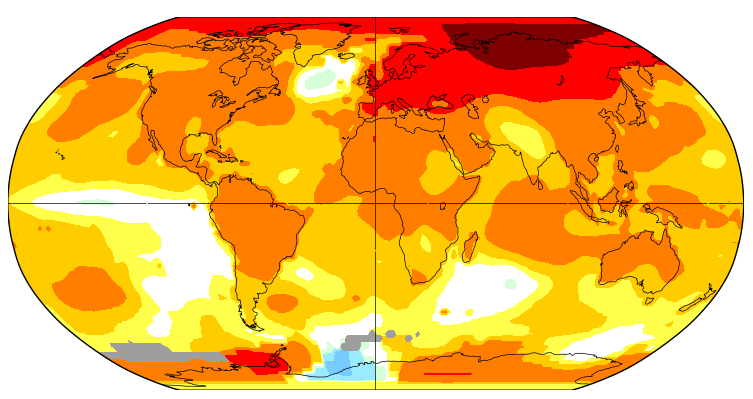Data, where is thy sting? With media outlets all independently hitting on May 2025 being the second-hottest on record Steve Milloy at @JunkScience, with a rude word we omit, asked “If May was ‘second hottest on record’, why was May 2025 cooler than May 1896 in the US? Is the US regionally exempt from global warming?” As he went on to say “The US has by far and away the most comprehensive temperature coverage on the planet – yet May was not close to anything ‘hottest.’” Suggesting that a lot of fiddling and fudging is going on instead of good old-tyme “If your mother says she loves you, check it out” journalism that asks where numbers come from and who’s pushing what agenda.
We could say a lot more about this figure produced by the European Copernicus agency and swallowed whole by the press. For instance even the Guardian somehow blurts out in the midst of the panic-mongering that this month of blazing harbinger death was, uh, what’s this?
“The month was 1.4C above the estimated 1850-1900 average used to define the pre-industrial level. This interrupts a period of 21 months out of 22 where the global average temperature was more than 1.5C above the pre-industrial level.”
Oh, there’s a headline. “May 2025 cools trend”. Now clear out your desk. Instead, naturally, it proves we’re above that dreaded level:
“Carlo Buontempo, director of C3S at the European Centre for Medium-Range Weather Forecasts (ECMWF), said: ‘May 2025 breaks an unprecedentedly long sequence of months over 1.5C above pre-industrial. Whilst this may offer a brief respite for the planet, we do expect the 1.5C threshold to be exceeded again in the near future due to the continued warming of the climate system.’”
There’s also the issue of them all saying some variant of the Euronews.green wording:
“Data shows that the global average surface air temperature was 15.79ºC last month, 0.53ºC higher than the 1991 to 2020 average.”
Bosh. Data do not show global temperature to two decimal places even today, let alone in 1991. But all the cool kids think it does, including Reuters. Just as all the sources we have cited manage, with fearless originality, to quote Buontempo verbatim. And none asks anyone for a different angle on the matter. Unless you count Reuters also going to World Weather Attribution for something even less credible and printing it without a hint of sober second thought.
Incidentally we went to the Copernicus study, or rather the press release, since this is an exercise in PR, and found that in their view:
“May 2025 was the second-warmest May globally, with an average ERA5 surface air temperature of 15.79°C, 0.53°C above the 1991-2020 average for May. May 2025 was 0.12°C cooler than the record May of 2024, and 0.06°C warmer than the third warmest of 2020. May 2025 was 1.40°C above the estimated 1850-1900 average used to define the pre-industrial level…”
Point zero six above 2020? Can they say with a straight face that they’ve measured global temperature comprehensively to that degree of precision? Of course not. We’re not even buying the 0.1, let alone the 2 that followed it. As for that estimated 1850-1900 average, as we’ve said before, if you think we know the temperature for every square foot of what was then the Belgian Congo in 1873, or the mid-Pacific, or for that matter Rome, you are a chump or worse.
We’d say so even without Milloy’s point. But we say it that much more loudly with it. You have a bunch of tendentious reconstructions of global temperature by people convinced man is cooking the planet, and then you have a long run of careful measurements of American temperature by people convinced it was important to know how hot or cold it was, and when the former contradict the latter you go with the former because you are convinced man is cooking the planet. And journalists can’t think of a question.
Not even “If the Earth is relentlessly heating, why isn’t May 2025 hotter than May 2024, and why is May 2020 hotter than May 2021?”
P.S. The UAH satellite temperature series has May 2025 0.4 degrees cooler than May 2024. But who’s counting? Or doing research before writing activist news stories?
P.P.S. As we contemplate single-digit overnight temperatures in mid-June in Ottawa (in Celsius as we trust is obvious) it’s nice to hear that “Canada is expected to see a warmer-than-usual summer with uncertain precipitation levels in most provinces, based on Environment and Climate Change Canada’s summer forecast.” We never had uncertain precipitation levels, or even unpredictable rainfall, before there was climate. But if it’s not warmer than usual we’ll certainly get… no retraction.


